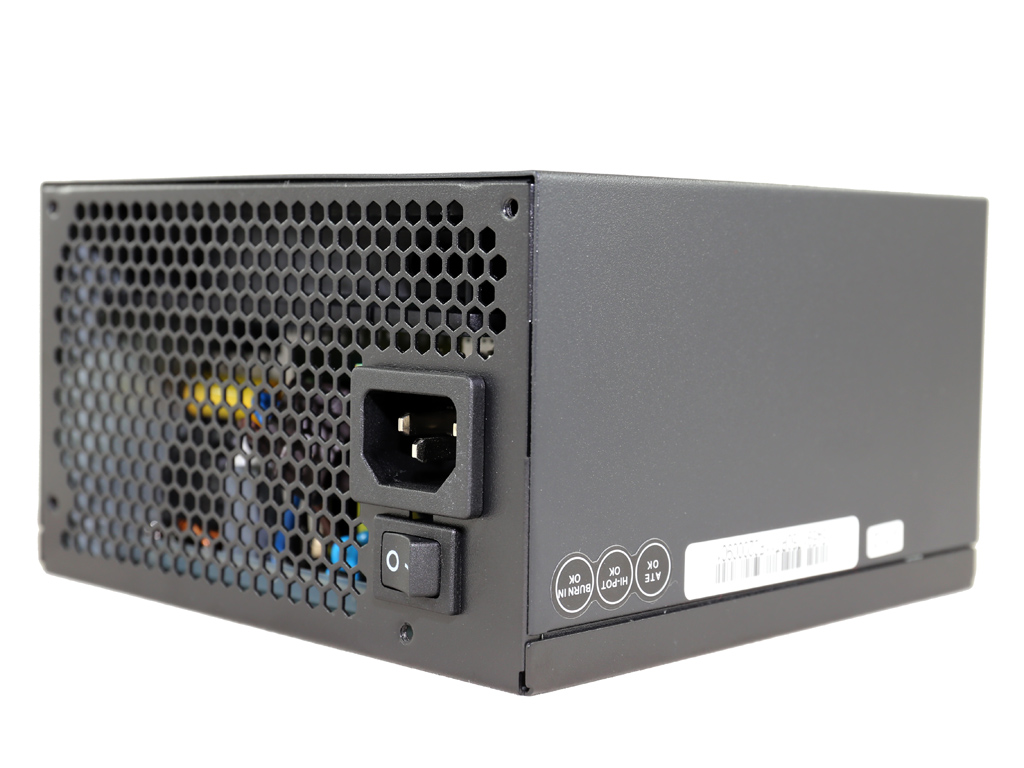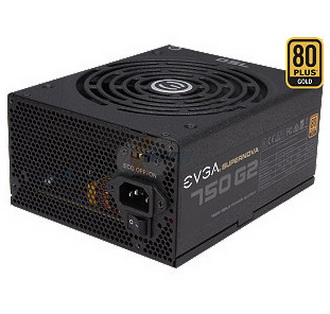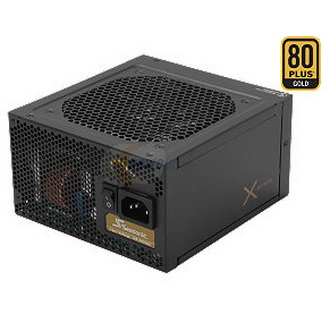EVGA GQ Series 750W PSU Review
EVGA teamed up with FSP once again to produce the new GQ line, which is one step below the highly popular G2 series. The four GQ PSUs feature 80 Plus Gold efficiency and semi-modular cabling, promising quiet operation.
Why you can trust Tom's Hardware
Load Regulation, Hold-Up Time And Inrush Current
To learn more about our PSU tests and methodology, please check out How We Test Power Supply Units.
Primary Rails And 5VSB Load Regulation
Load Regulation testing is detailed here.
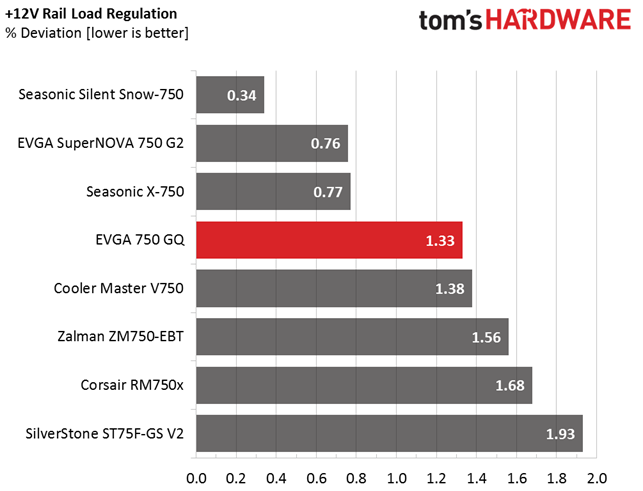
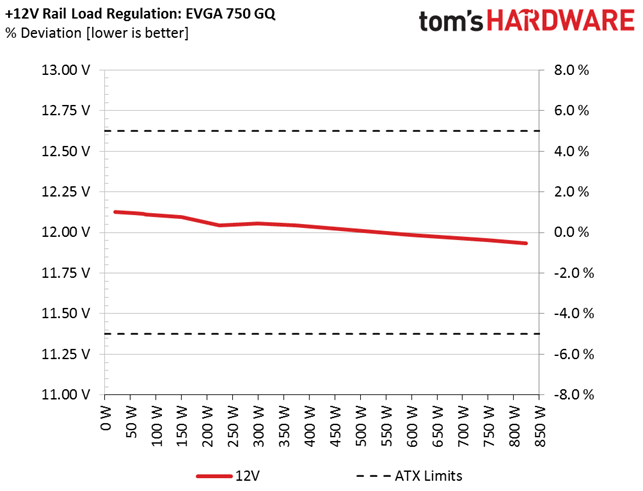
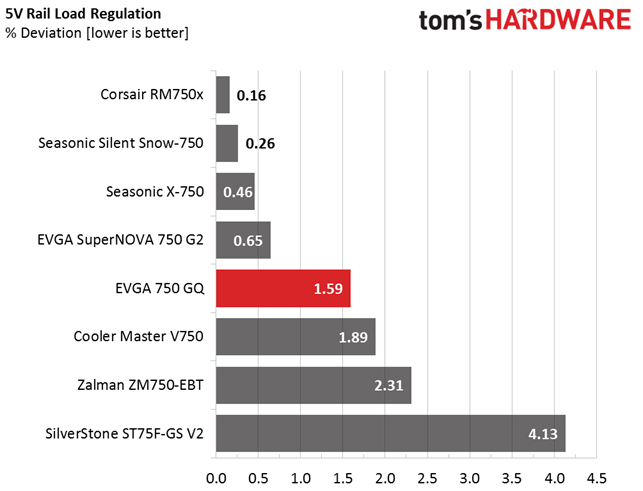
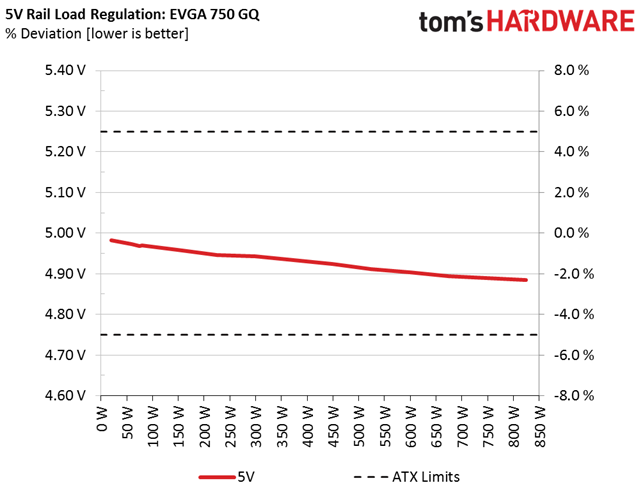
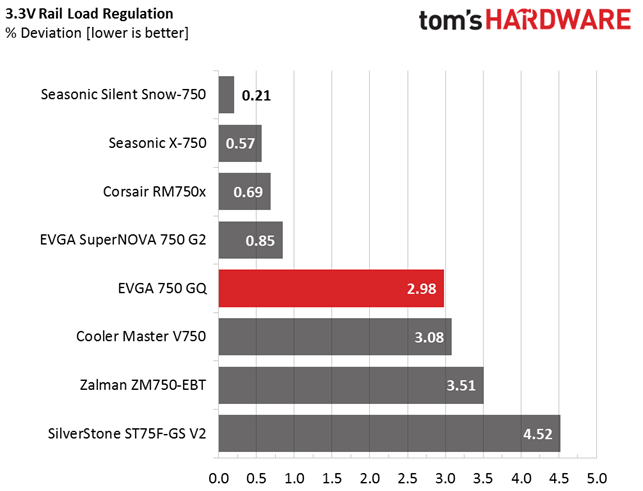
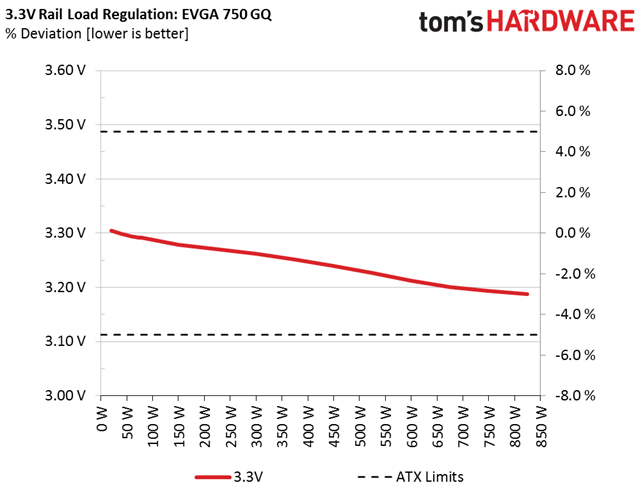
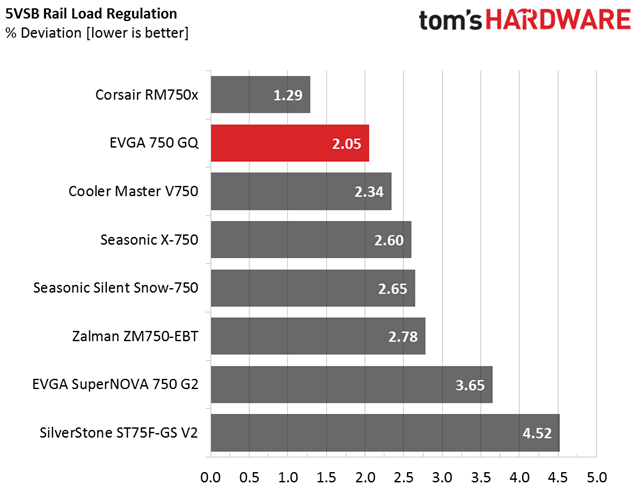
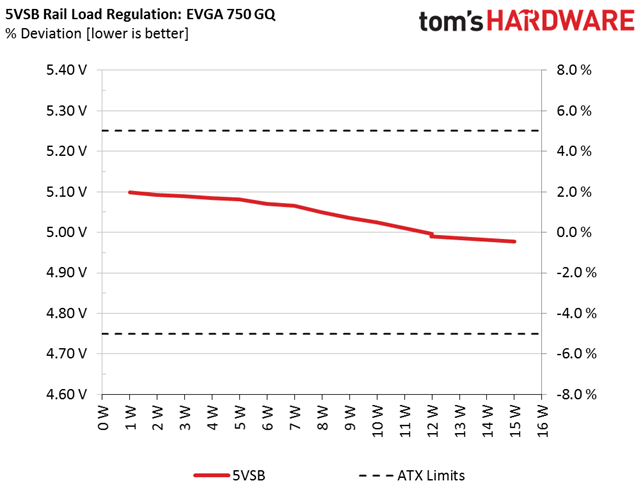
Hold-Up Time
Our hold-up time tests are described in detail here.
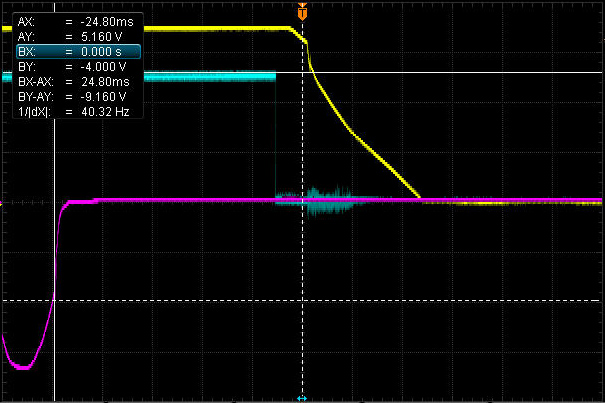
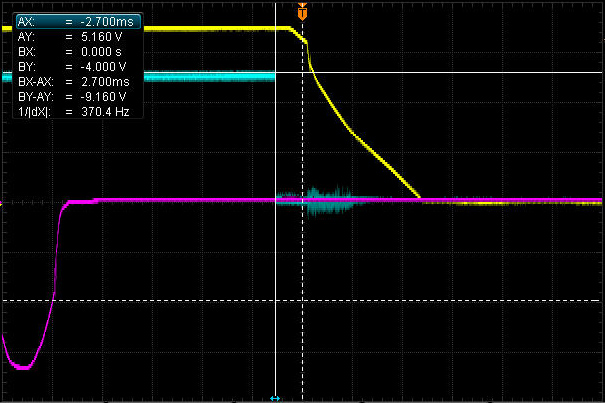
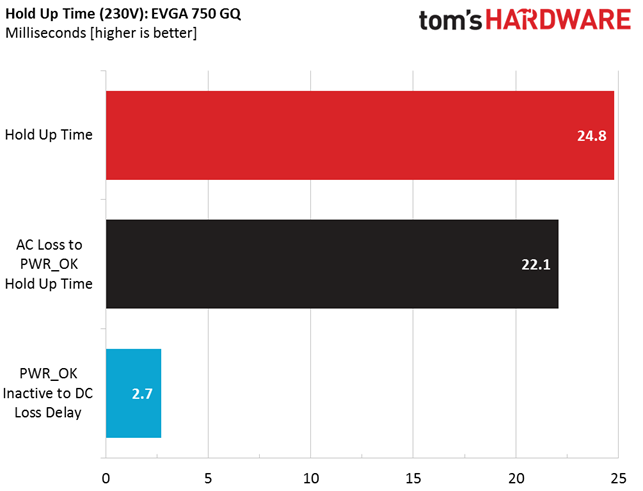
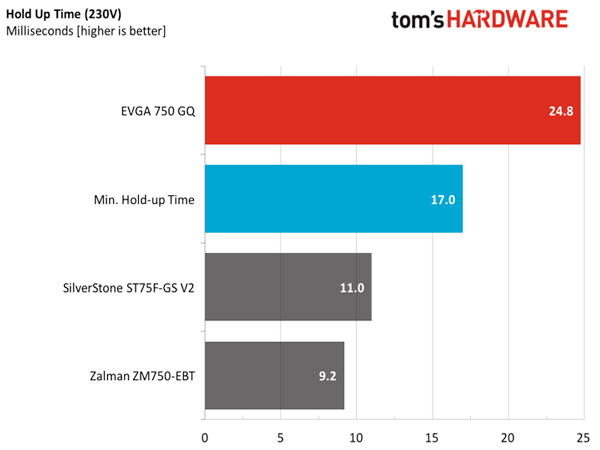
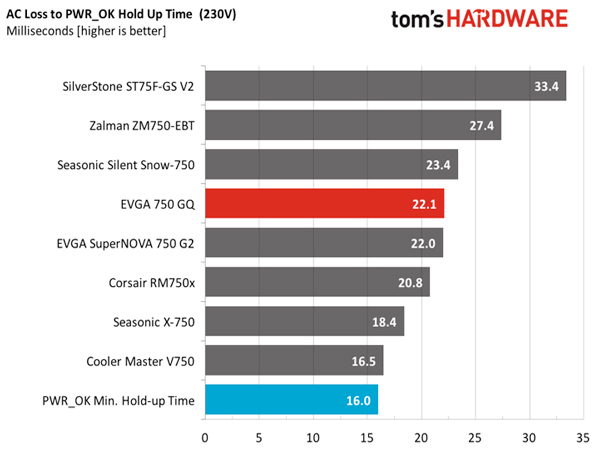
Our experience so far dictates that ACRF topologies are capable of high hold-up times; the 750 GQ is definitely not an exception, since it achieves 24.8ms. In addition, the power good (PWR_OK) signal follows the ATX spec's requirement and drops before the rails go out of spec. Very good performance here!
Inrush Current
For details on our inrush current testing, please click here.
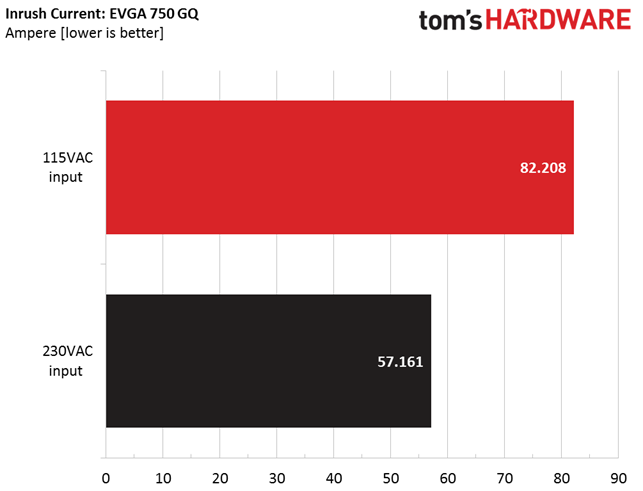
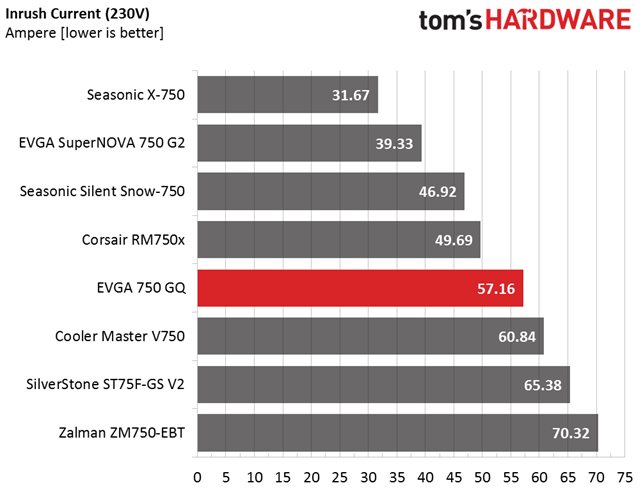
The NTC thermistor is very small, resulting in increased inrush current with both 115V and 230V input. EVGA should probably use a larger thermistor for this purpose. It wouldn't affect the PSU's efficiency since there is a diode bypass when the start-up phase finishes.
Load Regulation And Efficiency Measurements
The first set of tests reveals the stability of the voltage rails and the PSU's efficiency. The applied load equals (approximately) 10 to 110 percent of the maximum load the supply can handle, in increments of 10 percentage points.
Get Tom's Hardware's best news and in-depth reviews, straight to your inbox.
We conducted two additional tests. During the first, we stressed the two minor rails (5V and 3.3V) with a high load, while the load at +12V was only 0.10A. This test reveals whether a PSU is Haswell-ready or not. In the second test, we determined the maximum load the +12V rail could handle with minimal load on the minor rails.
| Test # | 12V | 5V | 3.3V | 5VSB | DC/AC (Watts) | Efficiency | Fan Speed (RPM) | Noise (dB[A]) | Temps (In/Out) | PF/AC Volts |
|---|---|---|---|---|---|---|---|---|---|---|
| 1 | 4.390A | 2.013A | 2.003A | 0.981A | 74.76 | 87.29% | 0 | 0 | 37.68 °C | 0.951 |
| 12.114V | 4.968V | 3.291V | 5.081V | 85.65 | 41.53 °C | 115.0V | ||||
| 2 | 9.832A | 3.019A | 3.016A | 1.181A | 149.76 | 90.40% | 0 | 0 | 38.62 °C | 0.977 |
| 12.095V | 4.959V | 3.278V | 5.070V | 165.66 | 43.21 °C | 115.0V | ||||
| 3 | 15.678A | 3.528A | 3.542A | 1.380A | 224.86 | 91.17% | 0 | 0 | 40.50 °C | 0.988 |
| 12.045V | 4.946V | 3.270V | 5.065V | 246.64 | 45.49 °C | 115.0V | ||||
| 4 | 21.448A | 4.045A | 4.040A | 1.580A | 299.71 | 91.01% | 620 | 31.7 | 41.89 °C | 0.994 |
| 12.055V | 4.943V | 3.262V | 5.050V | 329.33 | 47.51 °C | 115.0V | ||||
| 5 | 26.926A | 5.061A | 5.068A | 1.786A | 374.71 | 90.59% | 800 | 35.2 | 43.52 °C | 0.996 |
| 12.043V | 4.933V | 3.251V | 5.036V | 413.64 | 49.63 °C | 115.0V | ||||
| 6 | 32.422A | 6.089A | 6.103A | 1.988A | 449.58 | 89.99% | 1040 | 40.0 | 44.82 °C | 0.997 |
| 12.024V | 4.924V | 3.239V | 5.025V | 499.60 | 51.49 °C | 115.0V | ||||
| 7 | 37.940A | 7.117A | 7.154A | 2.195A | 524.54 | 89.20% | 1250 | 44.2 | 43.73 °C | 0.997 |
| 12.006V | 4.912V | 3.226V | 5.010V | 588.02 | 47.60 °C | 115.0V | ||||
| 8 | 43.480A | 8.159A | 8.209A | 2.401A | 599.52 | 88.63% | 1285 | 45.7 | 44.23 °C | 0.998 |
| 11.986V | 4.903V | 3.212V | 4.996V | 676.47 | 48.63 °C | 115.0V | ||||
| 9 | 49.472A | 8.681A | 8.770A | 2.401A | 674.57 | 87.64% | 1575 | 47.6 | 44.98 °C | 0.998 |
| 11.967V | 4.894V | 3.201V | 4.990V | 769.74 | 49.98 °C | 115.0V | ||||
| 10 | 55.190A | 9.201A | 9.290A | 3.012A | 749.32 | 86.50% | 1790 | 49.4 | 46.49 °C | 0.998 |
| 11.953V | 4.889V | 3.193V | 4.977V | 866.32 | 51.94 °C | 115.0V | ||||
| 11 | 61.557A | 9.208A | 9.303A | 3.013A | 824.31 | 85.02% | 2130 | 57.6 | 47.45 °C | 0.998 |
| 11.935V | 4.885V | 3.188V | 4.975V | 969.60 | 53.60 °C | 115.0V | ||||
| CL1 | 0.099A | 14.020A | 14.005A | 0.004A | 115.80 | 82.87% | 900 | 37.0 | 43.09 °C | 0.973 |
| 12.121V | 4.938V | 3.238V | 5.081V | 139.74 | 46.82 °C | 115.0V | ||||
| CL2 | 62.444A | 1.002A | 1.003A | 1.002A | 759.91 | 86.48% | 1850 | 49.9 | 44.59 °C | 0.998 |
| 11.958V | 4.912V | 3.229V | 5.030V | 878.71 | 49.55 °C | 115.0V |
Load regulation at +12V is tight enough, though it doesn't stand up to EVGA's 750 G2. The same goes for the 5V rail, while the 3.3V rail is on the loose side with close to 3 percent deviation. Lastly, the 5VSB rail surprises us with tight load regulation, at least for that rail's standards.
As you can see from the noise output column, the PSU runs passively up to our 30% load test, yielding silent operation. At 40 percent load, the fan starts spinning slowly. It takes a 60 percent load for the noise to become noticeable. The noise increases quickly as the load increases. In our worst-case test, the fan screamed along, annoying anyone in its vicinity. FSP definitely uses a high-speed fan, and although it spins slowly in most cases, when you push the PSU it makes a ton of noise.
We left the efficiency performance for last. It's very good under light and moderate loads, but then drops below the specified limit during our full load test. Given the almost 47 °C ambient environment we used, though, we'll give EVGA a pass, especially since the 80 Plus organization conducts its tests at only 23 °C.
Current page: Load Regulation, Hold-Up Time And Inrush Current
Prev Page A Look Inside And Component Analysis Next Page Efficiency, Temperature And Noise
Aris Mpitziopoulos is a contributing editor at Tom's Hardware, covering PSUs.
-
10tacle Huh. Johnny Guru gave two variants of this PSU series recommended ratings back in Nov. & Dec (650, 850). I saw a 650W on sale at NewEgg last December for $50(US) after rebate and almost recommended it to a friend, but I didn't as I hadn't seen a JohnnyGuru review on the GQ series yet (they gave it a 9.4). They also gave the 850W version a 9.2 rating back in November.Reply
Not sure what happened with this 750W example, but it sounds more like what one would expect with a Corsair CX750 example. Definitely not the same results that Johnny Guru got with two different GQ variants. -
Aris_Mp The lower capacity GQ models use a different platform from the higher capacity ones (850W and more).Reply
The design of the 650 and 750 GQ models doesn't allow for better performance, especially in ripple performance. -
dstarr3 Eh, I'd stick with the G2 series. That's a lot more quality for only a small price premium. And really, the PSU is probably the worst place to cut costs in a system build.Reply -
basroil Oh god, another PoS EVGA unit that shares a similar name to the spectacular G2... I can see a flood of "my graphics card has coil whine", "my computer constantly crashes", and "my headphones have static/popping (only when playing games)" posts in the forum soon...Reply -
joz ReplyEh, I'd stick with the G2 series. That's a lot more quality for only a small price premium. And really, the PSU is probably the worst place to cut costs in a system build.
Agreed. G2 550 and 650's are great. And the P2 750+ if you need that sort of power are great too. But these...."craptacularripplefail," units EVGA is tossing out is really hurting their image. I understand market catering and such, but they need to rethink their strategy. They aren't going to win any price/perf races while Corsair can continue to throw their shitty cx units out the window to customers. And EVGA I hold to higher standards then Corsair, so its kind of a shame to see the performance of these lower quality power supplies. -
Dark Lord of Tech I would take the EVGA G2 , P2 , T2 over any other POWER SUPPLIES including Seasonic.Reply -
jonnyguru ReplyAgreed. G2 550 and 650's are great. And the P2 750+ if you need that sort of power are great too. But these...."craptacularripplefail," units EVGA is tossing out is really hurting their image. I understand market catering and such, but they need to rethink their strategy. They aren't going to win any price/perf races while Corsair can continue to throw their shitty cx units out the window to customers. And EVGA I hold to higher standards then Corsair, so its kind of a shame to see the performance of these lower quality power supplies.
Unfortunately, you can't be too profitable selling only niche higher end product. At some point, if you want the board of directors to let you continue putting out power supplies, you have to put something out that can do volume. The B2 Series, The GQ Series, etc. Don't like them? Don't buy them. Is it hurting their reputation? No. Not as long as higher end units like the G2, P2, etc. continue to be solid. But if they start to slip for whatever reason, then you can say their reputation is in jeoprady. Seriously. Hardly anybody judges the Corvette because of the Chevy Spark (well... maybe some Ford fanboys, but still). -
Dark Lord of Tech I like the GQ's and recommend them , also love the Corsair RMx series and recommend those too.Reply -
PureBlackFire ReplyHuh. Johnny Guru gave two variants of this PSU series recommended ratings back in Nov. & Dec (650, 850). I saw a 650W on sale at NewEgg last December for $50(US) after rebate and almost recommended it to a friend, but I didn't as I hadn't seen a JohnnyGuru review on the GQ series yet (they gave it a 9.4). They also gave the 850W version a 9.2 rating back in November.
Not sure what happened with this 750W example, but it sounds more like what one would expect with a Corsair CX750 example. Definitely not the same results that Johnny Guru got with two different GQ variants.
well, this is hardly the first time an FSP platform performed reasonably well at 650 watts and sucked at 750. sure it won't be the last either. as for the 850, like Aris said, based on a different (better) design.
-
10tacle Reply17373323 said:well, this is hardly the first time an FSP platform performed reasonably well at 650 watts and sucked at 750. sure it won't be the last either. as for the 850, like Aris said, based on a different (better) design.
That's just not right. A certain series should be of the same quality across the series offerings. There's a reason people shop for different series for their needs (budget vs. quality, etc.). Hell it's complicated enough already just trying to keep up with each OEM series line offerings and their quality tiers. I mean we all know the general quality difference between Corsair's CX line and EVGA's G2 line.
